SHRS Innovation Seminar Series
The SHRS Innovation Seminar Series is an opportunity for our community to gather together to learn about commercialization as an impactful rehabilitation research translation strategy. The open discussions included during each seminar are a networking opportunity and facilitate interdisciplinary collaboration on specific commercialization projects.
The series is co-sponsored by the School of Health and Rehabilitation Sciences and the Office of Innovation and Entrepreneurship’s Innovation Institute.
Please note that we have reformatted this series to the OIE Webinar Series.
Please check out the recordings below of previous webinars and join us for our new series for Pitt innovators!
Fall 2023 Schedule:
Nov 13: “Turning Ideas into Impact: The Road to Technology Commercialization”
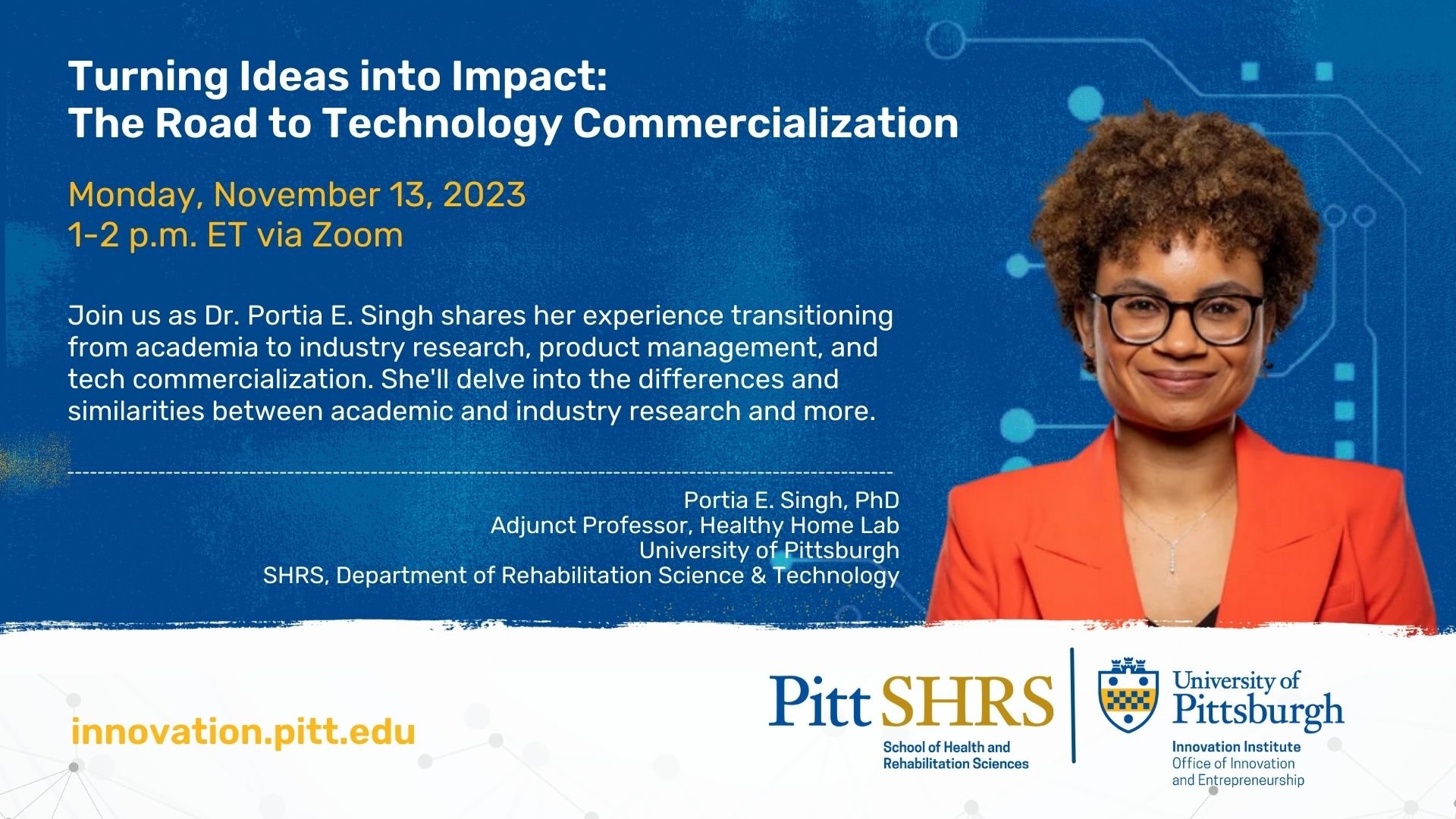
Presenter: Portia Singh, PhD
Adjunct Professor, Healthy Home Lab
University of Pittsburgh
SHRS, Department of Rehabilitation Science & Technology
Portia Singh, PhD will discuss her journey of transitioning from academia to industry research to product management / tech commercialization. She will compare and contrast academic and industry research, discuss the process of taking research to the market and explore the Healthy Home Lab Smart Home Division tech commercialization opportunity.
Portia Singh currently serves as Adjunct Faculty in the Department of Rehabilitation Science and Technology and Technology Commercialization Lead in the Healthy Home Lab. Portia has over a decade of experience creating and deploying technology to support older adults and their informal caregivers. Portia spent 8 years at Philips Research North America leading the Connected Aging team before transitioning into product management in the Philip Lifeline business, leading their digital consumer and AI product portfolios. Portia has authored several patents and trade secrets. Prior to joining SHRS, Portia was the Director of Research for Cariloop, a startup focused on delivering caregiver support services as an employee benefit. Portia has a B.S. in Computer Science from Grambling State University and a PhD in Biomedical Engineering from Carnegie Mellon University.
Previous Seminars:
-1.jpg?width=1920&height=1080&name=SHRS%20Innovation%20Seminar(5)-1.jpg)
Sep 18: Unlocking Innovation
Part I: Pitt Ventures NSF I-Corps Preview
John Inserra will provide an I-Corps introduction and a taste of the NSF I-Corps Hub program curriculum.
Join us for this virtual seminar featuring John Inserra, Program Manager of the NSF I-Corps Hub at the Innovation Institute. He'll take you on a journey into the world of I-Corps and offer a sneak peek into the transformative Pitt Ventures I-Corps Short Course curriculum. The Pitt Ventures I-Corps Short Course is a dynamic innovation commercialization training program designed to propel Pitt's cutting-edge research innovations into market-ready products and services, positively impacting lives.
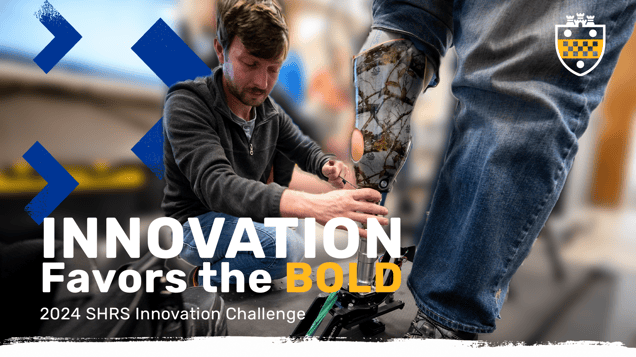
Part II: SHRS Innovation Challenge
We will also be discussing the 2024 SHRS Innovation Challenge which is an opportunity for faculty to move early-stage discoveries from the University of Pittsburgh's School of Health and Rehabilitation Sciences towards the market in tandem with the Regional NSF I-Corps. A total of $100,000 is available to the winners of the SHRS Innovation Challenge! Cross-campus collaboration is encouraged!
May 8: The Elevator Pitch Workshop (How More Than $100 Million Was Raised From Mostly High-Net Worth Investors)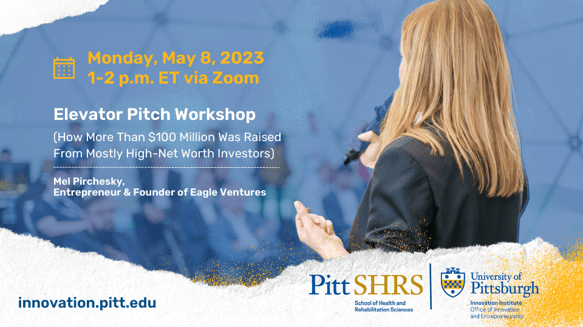
The goal of this workshop is to assist participants in refining a pitch that effectively articulates the value of their project to prospective stakeholders. This workshop is intended to help your team and you be more competitive in your fundraising endeavors.
Mel Pirchesky is a long-time Pittsburgh entrepreneur and is the founder and President of Eagle Ventures. He is the go-to guy in the Pittsburgh-region for entrepreneurial coaching on Elevator Pitches, and also regularly delivers high-impact coaching to help entrepreneurs effectively articulate their company's value proposition. He has raised more than $100 million in equity solely from high net worth individuals.
-2.png?width=586&height=330&name=SHRS%20Innovation%20Seminar%20-%20Dec%202022%20(Digital%20Screen)-2.png)
April 10: Translation from Clinical Research to Commercialization
Clinical research is an important field that can lead to new treatments and therapies for patients. However, taking these ideas from the lab to the market can be a challenging process. In order to translate clinical research to commercialization, it is important to collaborate with experts from various fields, such as business, marketing, and technology.
Drs. Skidmore, Wang, and Zhou will present an overview of collaborative activities that have moved an idea born in clinical research to a new clinical tool with widespread commercialization potential.
About their tool: Drs. Wang and Zhou leveraged natural language processing, computer vision processing, and artificial intelligence techniques to develop an automated fidelity assessment tool that can be commercialized for use in clinical rehabilitation settings. The team will describe their process of collaboration and plans for commercialization.
March 13: Lessons Learned from Medical Device Entrepreneurs
.jpg?width=510&height=287&name=SHRS%20Innovation%20Seminar%20-%20Dec%202022%20(Digital%20Screen).jpg)

February 13: Sources of Funding: What You Need to Know
Dan Broderick, Entrepreneur in Residence, Office of Innovation and Entrepreneurship, Innovation Institute
Dan Broderick will review the various sources for early-stage capital and share insights and tips gained from 30+ years of investing and fundraising experience to help the Pitt entrepreneur on their fundraising journey.
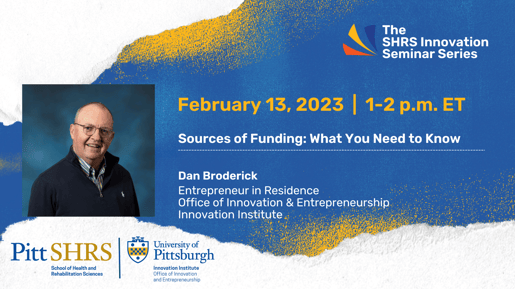
January 9: Innovation Through Industry-Sponsored Product Development and Evaluation Projects
Garrett Grindle, Associate Director Engineering, Pitt HERL
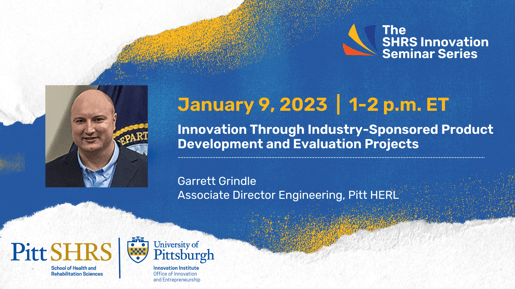
Topics covered:
Garrett Grindle, PhD is the Associate Director for Engineering at HERL and a Research Scientist at the University of Pittsburgh. He received his bachelor’s and master’s degrees in Bioengineering, and his doctorate in Rehabilitation Science at Pitt. Dr. Grindle’s primary role at HERL is to oversee device design, development, and prototyping for HERL’s portfolio of projects. He has extensive experience with designing and fabricating assistive technology prototypes that are suitable for use in field trials. Dr. Grindle also leads the technical side of the Technology Transfer Assist Program, which helps move VA inventions to commercial licensees through the creation of high-fidelity prototypes. Additionally, Dr. Grindle’s research interests include: assistive robots, adaptive sports equipment, power wheelchair interfaces, and the use of device smart device to assist with transfers.
December 12, 2022: “Jump Starting Your SBIR Proposal Preparation" with Phil Brooks
(1)-2.jpg?width=526&height=296&name=SHRS%20Innovation%20Seminar%20-%20May%20-%20July%202022%20(Digital%20Screen)(1)-2.jpg)
Through America's Seed Fund startups can get up to $2 million to develop deep technologies. Phil Brooks will walk you through the process and timeline, how to submit a proposal and what to expect along the way.
Phil is a Management Consultant with strong financial, economic and accounting skills. His experience is developed from 40 years of consulting through his own firm currently and previously with Big Four accounting firms and boutique consulting firms.
His company, Brooks Consulting, has worked as a grant consultant for SBIR/STTR Phase I, Phase II, Fast Track, Broad Agency Announcement, Rapid Innovation Fund, i6 SBIR supplement and Commercialization Accelerator/ Assistance Program proposals. Submitting to seven agencies (DOD, DOE, DOT, ED, EPA, NIH, NSF), their work has resulted in awards totaling almost $9 million in grants to their clients.
November 14, 2022: SEEDing Biomedical Innovation: Support for Small Businesses at NIH with Stephanie Fertig
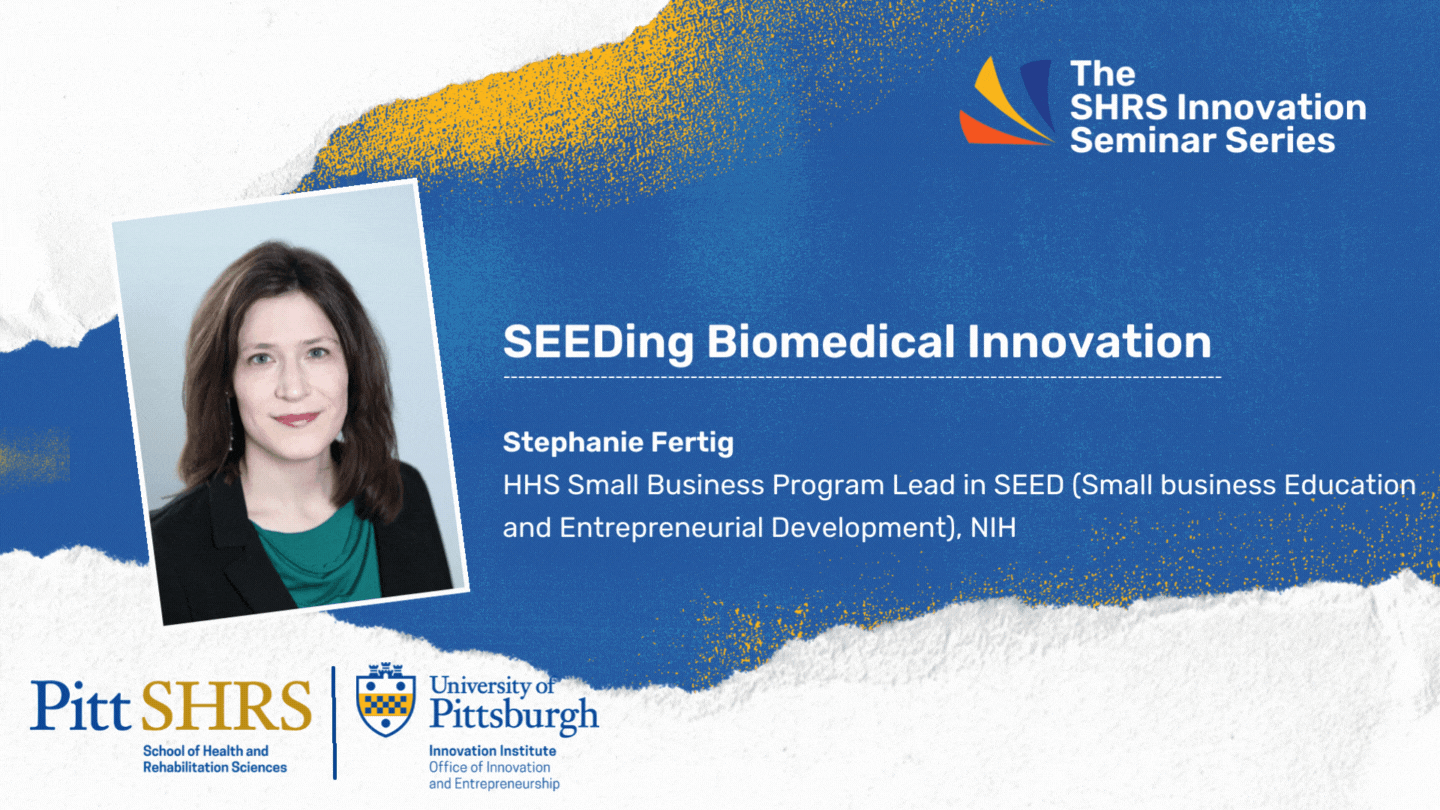
Access .pdf of this presentation.
Academic innovators can access up to $1.2 billion in small business funding from the NIH's Seed Fund through the Small Business Innovation Research (SBIR) program or the Small Business Technology Transfer (STTR) program. Join us to learn how these programs give access to essential funding for startups.
Ms. Stephanie J. Fertig is the HHS Small Business Program Lead in SEED (Small business Education and Entrepreneurial Development) at the National Institutes of Health (NIH). She currently oversees the Health and Human Services (HHS) Small Business Innovation Research (SBIR) and Small Business Technology Transfer (STTR) programs, which includes the NIH SBIR and STTR programs. The HHS SBIR and STTR programs are congressionally mandated set-aside programs that provide over $1.2 billion dollars per year to small business concerns. Prior to joining SEED, she managed the SBIR and STTR Programs at the National Institute of Neurological Disorders and Stroke (NINDS). During her over 15 years at NIH she has led the development and implementation of multiple programs focused on small businesses and translational research. Ms. Fertig has a Bachelor of Science degree in Chemistry with a major in Physics from the University of Virginia and a Master of Business Administration from the University of Maryland’s Robert H. Smith School of Business.
October 10, 2022: The Secret to Selling to Hospitals with Kevin Trout
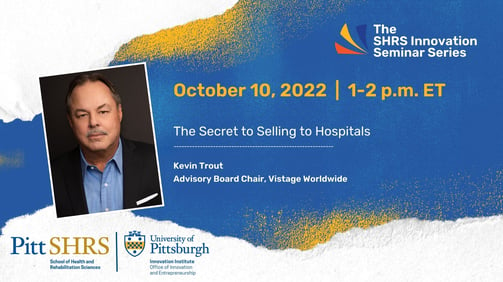
When your technology or device helps hospitals be more efficient, reduce costs, eliminate errors, or save lives, one overarching question remains: how do get in conversations with the right stakeholders at hospitals? And when you finally talk to a decision-maker, how do you eliminate potential barriers? This seminar will uncover how entrepreneurs can navigate the hospital buying process and be successful in selling to hospitals.
Kevin Trout is an experienced entrepreneur, business owner and sales professional with over 35 years of experience in the medical device industry. Kevin was the Founder/President of Grandview Medical Resources, Inc. in Pittsburgh, Pennsylvania; a specialty medical equipment distributor with an average annual growth rate of 23% per year, before selling his company in 2011.
By the time he retired in 2016, Kevin’s company was conducting business with approximately 90% of the hospitals in his market (western PA and West Virginia), which included a 10 year contract with UPMC Health System.
September 12, 2022: How to Get Your Medical Device Through the FDA
(1).jpg?width=441&name=SHRS%20Innovation%20Seminar%20-%20May%20-%20July%202022%20(Digital%20Screen)(1).jpg)
Michael Nilo is a biomedical engineer with 13+ years in the medical device industry, working at the FDA, for industry and as a consultant. He has hands-on familiarity with most functions and departments of a successful medical device company, and has provided consulting advice for verification and validation testing, quality systems, and regulatory submissions for different classes of medical devices. As a consultant, he has authored and submitted applications to FDA for Class II and III medical devices, and has extensive experience with Q-submissions, clinical trial development for medical devices, quality system regulations, and all manner of FDA interactions.
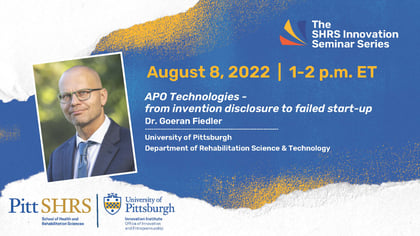
According to some statistics, 90% of startups fail. Dr. Fiedler's example, "APO Technologies" illustrates how this looks in practice; how a combination of misguided decisions, difficult environment, and simple bad luck doomed an initially promising business idea.
Topics Discussed:
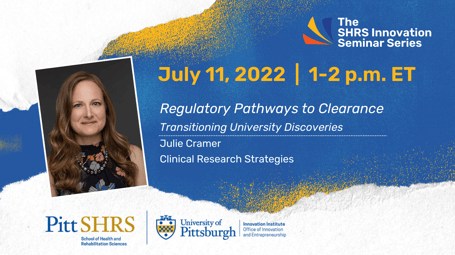
.jpg?width=455&name=SHRS%20Innovation%20Seminar%20-%20May%20%26%20June%202022%20(Digital%20Screen).jpg)
Monetizing your Research Outcomes: A Q&A with Pitt Senior Licensing Manager George Coulston
In this open question and answer forum with one of the University of Pittsburgh Innovation Institute’s leading experts in technology transfer, George Coulston will offer his thoughts on how to secure and monetize your Pitt intellectual property while enhancing the impact of your research.
(This session was not recorded.)
.png?width=455&name=SHRS%20Innovation%20Seminar%20-%20May%202022%20(Digital%20Screen).png)
"Diamond Kinetics: From the Ball Field to the Lab, to the North Shore, and Beyond" with Dr. William (Buddy) Clark from the University of Pittsburgh Dept. Mechanical Engineering & Materials Science
Just ten years ago, the primary instrument for measuring sports motions on the field was the coach’s eyes, which often fall short in providing useful and objective information. Diamond Kinetics was founded to fill that gap in baseball and softball with novel wearable sensing technology that, at the time, was just becoming feasible for capturing the high-speed human motions found in hitting and throwing in these games. This talk will tell the story of the company’s journey from ball field to the lab, out of the university to a Pittsburgh startup, and back onto the field, transforming millions of swing and throw events each year into useful information for users.
%20(4).png?width=457&name=SHRS%20Innovation%20Seminar%20-%20April%202022%20(Digital%20Screen)%20(4).png)
%20(1).png?width=386&name=SHRS%20Innovation%20Seminar%20-%20March-June%202022%20(Social%20Media)%20(1).png)
.